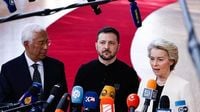On September 1, 2025, European Commission President Ursula von der Leyen’s plane was forced to land in Bulgaria after experiencing a sudden loss of navigation—an incident authorities and experts suspect was caused by Russian GPS jamming. The event, which unfolded as von der Leyen was traveling from Warsaw to Plovdiv on a private jet chartered by the European Commission, has reignited concerns about the growing frequency and severity of electronic warfare tactics targeting Europe’s leaders and infrastructure.
According to The Associated Press, the disruption occurred as the aircraft approached Plovdiv airport in central Bulgaria. The satellite signal used for the aircraft’s GPS navigation was lost, forcing the pilots to rely on backup navigation aids and even paper maps to complete the landing safely. European Commission spokesperson Arianna Podestà confirmed the GPS jamming, stating, “We can indeed confirm that there was GPS jamming. We have received information from the Bulgarian authority that they suspect that this was due to blatant interference by Russia.” Bulgarian authorities echoed this suspicion, with Interior Minister Daniel Mitov emphasizing that such incidents have been happening constantly since the beginning of Russia’s full-scale invasion of Ukraine in 2022.
This latest episode is far from isolated. Over the past several months, countries bordering Russia—including Finland, Latvia, Lithuania, and Estonia—have reported a spike in electronic interference affecting not just aircraft, but also ships and drones. The Associated Press has mapped nearly 80 such incidents across Europe since 2022, with experts noting that the frequency and reach of these attacks have only grown. In March 2024, for example, a plane carrying the British defense secretary had its satellite signal jammed while flying near Russian territory. Pilots and air traffic controllers from Sweden to Bulgaria are now “reinventing the old-school methods of navigating because they cannot rely on GPS anymore,” as intelligence analyst Eric Schouten told AP.
The timing of the disruption has drawn particular attention. Just hours before her flight, von der Leyen had described Russian President Vladimir Putin as a “predator” who had started four wars in Europe—Chechnya, Georgia, Crimea, and Ukraine—and warned that he would not change. “Putin is a predator. Putin’s proxies have been targeting our societies for years with hybrid attacks, with cyber-attacks,” von der Leyen said, as quoted by The Guardian. Her remarks came during a tour of the EU’s eastern frontline states, including Latvia, Lithuania, Estonia, Poland, Bulgaria, and Romania, aimed at shoring up support for Ukraine and discussing heightened defense spending.
While the Kremlin has denied any involvement, Kremlin spokesperson Dmitry Peskov dismissed allegations of Russian interference as “incorrect” in response to inquiries from the Financial Times. Nevertheless, European officials remain skeptical. “Since the beginning of the war in Ukraine in 2022, this type of GPS jamming of flights in certain regions near the conflict zone has been happening constantly,” noted Bulgaria’s Interior Minister Mitov. The European Commission’s Arianna Podestà stressed, “This incident actually underlines the urgency of the mission that the President is carrying out in the frontline member states.” She added, “We are, of course, aware and used to somehow, to the threats and intimidations that are a regular component to Russia’s hostile behaviour.”
The technical details of the incident reveal just how vulnerable modern aviation has become to electronic warfare. According to The Nightly, the airport’s GPS system was jammed, meaning the pilot could not access the usual signals and had to revert to manual navigation. FlightRadar data indicated the journey took nine minutes longer than scheduled, a delay attributed to the navigational difficulties. Despite the disruption, the airport’s transponder reported good GPS signal quality throughout the flight, suggesting the jamming was highly targeted. “We can indeed confirm that there was GPS jamming, but the plane landed safely in Bulgaria,” Podestà reiterated at a press briefing.
Some voices, however, have cautioned against sensationalizing the event. Anton Gerashchenko, a former adviser to the Ukrainian government, described the jamming as an “assassination attempt” on the President of the European Commission. But Russia expert Keir Giles, author of Who Will Save Europe, countered that jamming attacks have become so frequent that they have been “normalized.” Giles explained, “It’s incredibly inconvenient and expensive for all the countries that are affected. And it’s also a means of probing and testing the West, doing things that ought to be unacceptable and confirming that they can get away with it. So it’s grown and grown and grown.”
The incident comes at a time of heightened tensions between Russia and the West. Just days earlier, Russia launched a missile attack on Kyiv, killing at least 23 civilians, including children, and coming within 50 meters of the EU delegation building and the British Council. The targeting of civilians and diplomatic missions has drawn international condemnation, though not all Western leaders have responded with equal vigor. While leaders such as UK Prime Minister Keir Starmer and French President Emmanuel Macron quickly posted messages of outrage, others, including Australian Prime Minister Anthony Albanese and Foreign Minister Penny Wong, were notably silent in the immediate aftermath.
Against this backdrop, the EU has announced a €150 billion loan program for member states to fund rearmament, including the purchase of new missiles, drones, and cyber-defenses. Von der Leyen’s tour of frontline states has focused on the urgency of such investments. “The EU will continue to invest into defense spending and in Europe’s readiness even more after this incident,” Podestà said. The loans are designed to allow member states to sign long-term contracts for military equipment, bolstering Europe’s ability to respond to emerging threats.
The Institute for the Study of War, cited by The Nightly, observed that “the latest reports of likely Russian GPS jamming indicate that Russia is continuing its hybrid operations in Europe, and Russia could continue to target Western political and military officials as part of these operations.” Von der Leyen herself has been at the forefront of discussions with European and US officials about possible troop deployments and security guarantees for Ukraine after the war. European and allied leaders are now preparing to meet in Paris to finalize security guarantees and outline plans for a potential multinational troop deployment to Ukraine, with France and the UK taking leading roles.
As Europe grapples with the reality of persistent electronic warfare and hybrid attacks, the incident involving von der Leyen’s flight has become a stark reminder of the region’s vulnerabilities—and the urgent need for coordinated defense and resilience. As Podestà put it, “This incident actually underlines the urgency of the mission that the President is carrying out in the frontline member states.” For now, European leaders are left to navigate not only the skies, but also the shifting and unpredictable terrain of modern geopolitical conflict.





